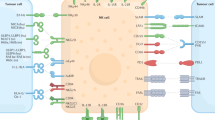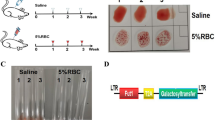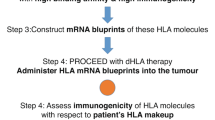Abstract
Prehn and Main1, in a review of the subject, state that the demonstration of circulating cytotoxins is much simpler when heterologous tissue transplants are used as antigens than when homologous tissues are used. Schrek and Preston2, using the Bagg rat lymphosarcoma in Sprague–Dawley rats, report the successful demonstration of serum cytotoxins in the rats (25 per cent of the total) in which the tumour had regressed.
This is a preview of subscription content, access via your institution
Access options
Subscribe to this journal
Receive 51 print issues and online access
$199.00 per year
only $3.90 per issue
Buy this article
- Purchase on Springer Link
- Instant access to full article PDF
Prices may be subject to local taxes which are calculated during checkout
Similar content being viewed by others
References
Prehn, R. T., and Main, J. M., J. Nat. Cancer Inst., 14, 537 (1953).
Schrek, Robert, and Preston, Frederick W., Surgical Forum of the American College of Surgeons (1954).
Coriell, Lewis L., Tall, Milton G., and Gaskill, Helen, Science, 128, 198 (1958).
Author information
Authors and Affiliations
Rights and permissions
About this article
Cite this article
CRANSTON, H., EGGERT, F. Homologous Species Neoplastic Antibodies. Nature 183, 1471–1472 (1959). https://doi.org/10.1038/1831471b0
Issue Date:
DOI: https://doi.org/10.1038/1831471b0
Comments
By submitting a comment you agree to abide by our Terms and Community Guidelines. If you find something abusive or that does not comply with our terms or guidelines please flag it as inappropriate.



